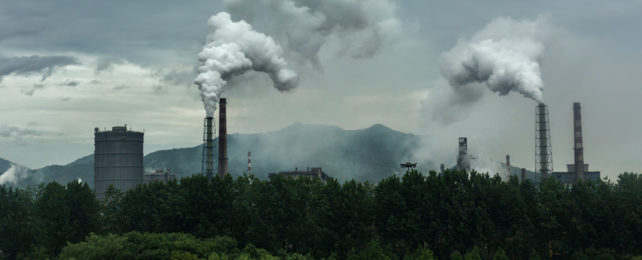Carbon dioxide emissions from fossil fuels, the main driver of climate change, are on track to rise 1 percent in 2022 to reach an all-time high, scientists said Friday at the COP27 climate summit in Egypt.
Emissions from oil, fueled by the continuing rebound in aviation, will likely rise more than 2 percent compared to last year, while emissions from coal – thought by some to have peaked in 2014 – will hit a new record.
"Oil is more driven by the recovery from COVID, and coal and gas are more driven by events in Ukraine," Glen Peters, research director at CICERO climate research institute in Norway, told AFP.
Global CO2 emissions from all sources – including deforestation and land use – will top out at 40.6 billion tons, just below the record level in 2019, the first peer-reviewed projections for 2022 showed.
Despite the wild cards of pandemic recovery and an energy crisis provoked by war in Ukraine, the uptick in carbon pollution from burning oil, gas and coal is consistent with underlying trends, the data suggested.
And deeply worrying, said Peters, a co-author of the study.
"Emissions are now 5 percent above what they were when the Paris Agreement was signed" in 2015, he noted.
"You have to ask: When are they going to go down?"
Carbon budget
The new figures show just how dauntingly hard it will be to slash emissions fast enough to meet the Paris goal of capping global warming at 1.5 degrees Celsius above preindustrial levels.
Heating beyond that threshold, scientists warn, risks triggering dangerous tipping points in the climate system.
Barely 1.2C of warming to date has unleashed a crescendo of deadly and costly extreme weather, from heat waves and drought to flooding and tropical storms made more destructive by rising seas.
To achieve the ambitious Paris target, global greenhouse emissions must drop 45 percent by 2030, and be cut to net zero by mid-century, with any residual emissions compensated by removing CO2 from the atmosphere.
To be on track for a net-zero world, emissions would have to plummet by 7 percent annually over the next eight years.
To put that in perspective: In 2020, with much of the world's economy on lockdown, emissions fell by only 6 percent.
Over a longer time frame, the annual rise in CO2 from fossil fuel use has slowed, on average, to 0.5 percent per year over the last decade after climbing three percent annually from 2000 to 2010.
To have a 50/50 chance of staying under the 1.5C limit, humanity's emissions allowance is 380 billion tons of CO2, according to the study in Earth System Science Data, authored by more than 100 scientists.
On current emissions trends of 40 billion tons a year, that "carbon budget" would be used up in less than a decade.
For a two-thirds chance, the budget shrivels by a quarter and would be exhausted in seven years.
'Deeply depressing'
In recent decades, scientists could usually draw a straight line between CO2 trends and the economy of China, which has been the world's top carbon polluter for about 15 years.
In 2022, however, China's CO2 output is set to drop by nearly 1 percent for the year, almost certainly reflecting an economic slowdown linked to Beijing's strict zero-COVID policy.
Despite having to scramble for alternate sources of energy, including carbon-intensive coal, the European Union is on track to see its emissions fall by almost as much, 0.8 percent.
US emissions will likely go up by 1.5 percent, and India's by 6 percent.
The annual update also revealed that the ability of oceans, forests, and soil to continue soaking up more than half of CO2 emissions has slowed.
"These 'sinks' are weaker than they would be if not for the impacts of a changing climate," said co-author Corinne Le Quere, a professor at the University of East Anglia.
Scientists not involved in the findings said they were grim.
"Global Carbon Budget for 2022 is deeply depressing," said Mark Maslin, a professor of Climatology at University College London.
"To have any chance of staying below the international[ly] agreed 1.5C global warming target we need to have large annual cuts in emissions – which there is no sign of."
